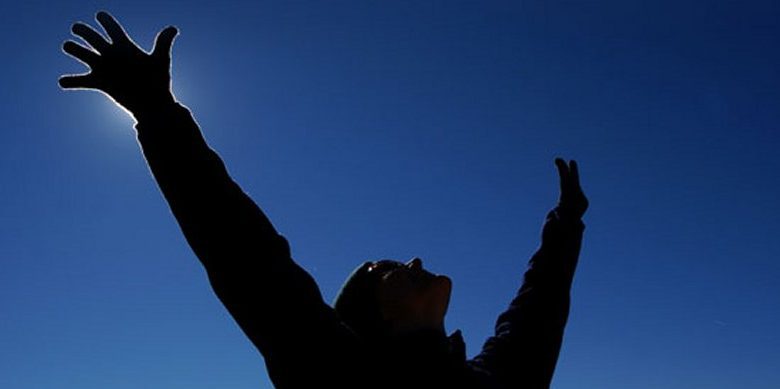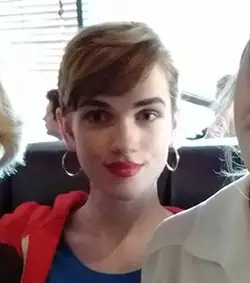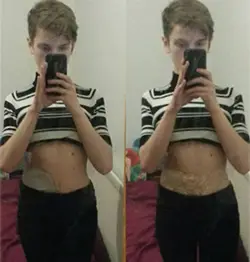
My disability: I wouldn’t have it any other way
We all know that having a disability or health condition can be hard. But being open about it, connecting with others in similar situations and being clear in your own mind about what’s right for you can make all the difference. Julia certainly knows how true this is, and hopes to inspire others by telling her story.
My name is Julia and I am twenty two years old. It’s only in the past four to five years of my life that I have started to proudly label myself as a disabled person, even though I have been labelled as such by others since before I can remember.
 I was diagnosed at birth with spina bifida occulta (a less severe form of spina bifida), sacral agenesis (where the lower spine forms abnormally), spinal syrinx (cysts at the bottom of the spine) and short bowel syndrome, for which I have a ileostomy pouch. I was in and out of hospital constantly from birth, but I mostly can’t remember those times, except when I used to get a lot of presents if I was in hospital over Christmas time!
I was diagnosed at birth with spina bifida occulta (a less severe form of spina bifida), sacral agenesis (where the lower spine forms abnormally), spinal syrinx (cysts at the bottom of the spine) and short bowel syndrome, for which I have a ileostomy pouch. I was in and out of hospital constantly from birth, but I mostly can’t remember those times, except when I used to get a lot of presents if I was in hospital over Christmas time!
To most people I appear able-bodied. But if someone does notice any impairment, it’s usually because I wear a brace on my right leg. As well as my spinal problems, I have had a number of operations on my leg, most notably the fixator frames to keep my legs straight. But apart from the inability to wear heels – which I don’t care too much about anyway! – this rarely affects me.
I also have a condition called scoliosis, which is a spinal curvature. It’s a very common condition, especially among young women. Normally it’s corrected during puberty by wearing a back brace, but as I was undergoing other operations on my leg at the time, the condition was diagnosed too late.
These conditions became more apparent as I began to grow. My scoliosis is likely to have been a result of one leg growing longer than the other, which has now twisted and raised my left hip as my body has tried to adjust to the differences. I am on the borderline for surgery to correct this, so the decision is entirely my choice. I’ll have another review next year to assess my hip pain, but as the procedure will probably only bring cosmetic benefits, I’ll probably turn it down because I don’t want metal bolts through my back for no reason.
During primary school the majority of my operations were under orthopedics and I found it easy to be open about these procedures. This was also the case during college when I had visible metal bolts through my leg and as a result had amazing biceps after a year on crutches.
When in high school I was introduced to new departments and began to attend clinics in urology and gynaecology for operations, which had to be timed around my age and development. I was reaching an age where I was becoming more concious of my body and had a better understanding of procedures, so my explicit consent was becoming more important.
 At one point during this time I was offered three operations, one of which was to reverse the ileostomy pouch (pictured right). My response to this offer was a firm no. I have had an ileostomy pouch since birth and although it can have side effects, such as being prone to weight loss and skin inflammation, I’ve coped with it more or less perfectly fine. I could therefore see no reason to reverse something I was very used to.
At one point during this time I was offered three operations, one of which was to reverse the ileostomy pouch (pictured right). My response to this offer was a firm no. I have had an ileostomy pouch since birth and although it can have side effects, such as being prone to weight loss and skin inflammation, I’ve coped with it more or less perfectly fine. I could therefore see no reason to reverse something I was very used to.
One small advantage would have been cosmetically. But there are plenty of healthcare companies offering cosmetic products to help make things look good, like the waistband I am pictured with on the right.
The urology and gynaecology operations have been left with a number of lower abdominal scars and, although I feel it is unlikely, if I decided to get pregnant, the foetus will only develop in half of my uterus.
So, there have been challenges, for sure. But, it was while I was on a ward for a stoma reconstruction that I spoke to a lot of other ostomy patients and realised just how much being open about intimate conditions has helped me. I also think it helps others about to experience different procedures.
Although it can be frustrating at times, overall hospitals have actually been a huge bonus for me. I have met a variety of people whilst in and out of wards and made some very close friends through fellow patients and staff. I have discovered, especially using social media, there are many others my age with similar conditions and they are all beautiful and confident women living full lives.
The only truly negative side to my conditions is the ignorant responses of those who make immature presumptions, knowing nothing about it. Never let anyone make you believe you are not entitled to a fulfilling life full of love, friends and fabulous experiences just because you have something that makes you a bit different from others. Hospitals and disability are huge part of my life and who I am and I wouldn’t have it any other way.
By Julia Blackwell
Why not connect with other people like you by reaching out to others on our Facebook page or Twitter @DHorizons.